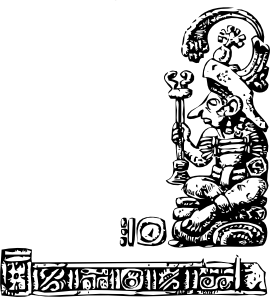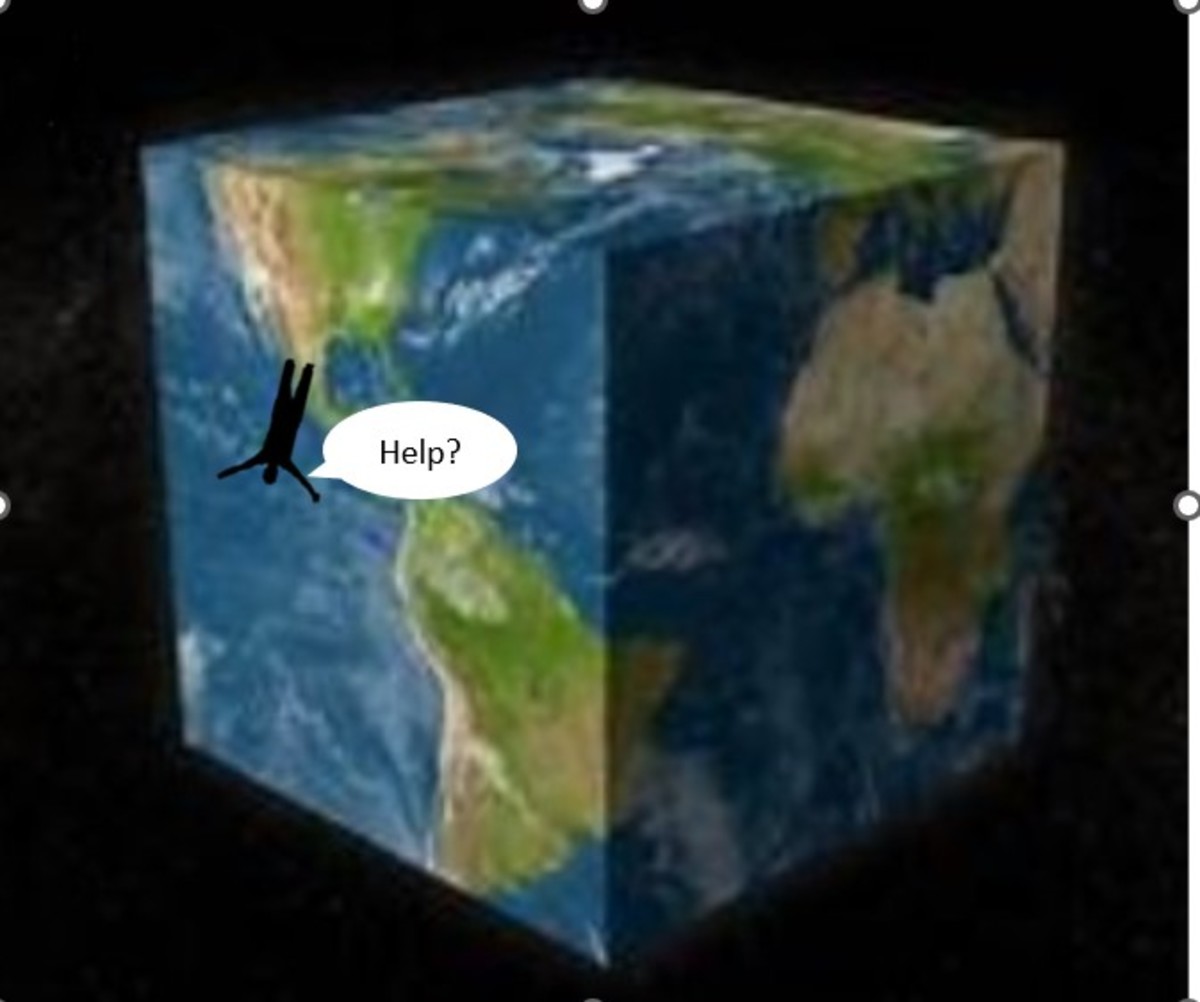A Thought Experiment in History and Psychology: Making the Maya Calendar
Thinking about Thinking
Couldn't just thinking about how people are and think make it clear that the Maya probably were not end-of-the-worlders (at least not any more than we are as a population)? First, Our Story; then ideas on thought experiment and human psychology.

OUR STORY
Setting: It's 1000 or so years ago, and no CAD.
Premise: So, these 4 guys get a job. The bosses want a millennial calendar. The bosses have some ideas about how they want it to look. They explain it to the guys.
Story: The guys find a cave with a big piece of dirt floor. (They need to keep their work out of the weather and away from the kids.)
The guys start drawing. They guys rub out some things and redo them. The bosses come by to check from time to time --- more rubbing out and redoing.
Some kids find the cave. They look at the guys' drawing. The kids think the calendar would be cooler if it was round and had more pictures.
They guys look at each other. Good ideas.
They talk to the bosses. More rubbing out and redoing. The guys have more thoughts: more rubbing out and redoing. The bosses come by: just move this here and that there. More r&d.
Here are the bosses for final review: they like it; it's ready for implementation. The guys have worked on it for so long that it is part of their brains. They find some good rock, get their tools and get to work.
They're done. The bosses come by. It's good. The bosses get some more guys and all the guys install the calendar.

What's next: Some other guys started the new building a few years ago. The bosses are thinking about putting another calendar there. (After all, the world won't end before this one runs out.) The 4 guys hope they get the job.
THOUGHT EXPERIMENT
A thought experiment uses logic to work out whether something might be possible. It doesn't matter whether or not the experiment actually is possible; thinking it through is enough. Types of thought experiments include (but may not be limited to):

- Pre-factual - This type of thought experiment uses the facts known at present under alternative scenarios, asking what would be the result if X happened? If Y happened?
- Counter-factual - This type uses substitute facts to ask: What would have happened if Y had occurred and not X? Would the result change?
- Semi-factual - This type asks: If X is substituted for Y, would the result remain the same? (Seems the same as counter-factual, depending on whether you want the result to be the same or different.)
- Prediction - Here, the question is: Given the current facts, what could happen if X, or Y or Z or occurred?
- Hindcasting - This type uses modeling to ask: Will the model chosen to forecast a future outcome really do so?
- Retro-diction or Post-diction - These test the results of operation of a model, asking: Did the model work? Or if not, what went wrong? Retro-diction and Post-diction include reverse-engineering and forensics.
- Backcasting - This type is similar to the prediction, but asks: If we want a particular result in the future, what state of facts will cause it to occur?
The thought experiment set out in Our Story is semi-factual. It asks the question: Just because there are end-of-the-worlders among us, does that make the Maya end-of-the-worlders? That is, would it make more sense than not that the Maya approached life more like most of us do? (I suppose that the results of their football matches might be a little harsh; but have you been to a Raiders game?)
Given the amount of ink that has been spilled and the number of trees killed on the backs of the Maya in the service of end-of-the-world prediction, the answer depends on:
- Your psychological makeup, and
- Your willingness to accept the actual facts.
Let's take the last point first.

The facts: The Maya Long Count calendar will come to an end at exactly 11:11 a.m. on December 21, 2012. Nothing in that calendar, however, contemplates a specific end point of time. Instead, the Maya calendar starts anew at the end of the cycle, just like ours does. Apparently, there is no actual source in ancient Maya culture that suggests otherwise. Given the Maya proclivity for ceremony, as the remains of their culture suggests, wouldn't extensive preparation for the end of the world be evidenced in some way, even if the end was a long way off? Wouldn't the May would have created some evidence of what they thought would happen to them after the world ended?
The theory that the Maya calendar somehow predicts the end of time is thought to spring from the work on Jose Arguelles, variously described as a New Age pioneer and as a wild-eyed, drugged up hippie. Mr. Arguelles blended together concepts that he claimed the Maya calendar represents with concepts from diverse sources such as the I Ching, and made various predictions from the blend. None of Mr. Arguelles' predictions, including that our calendar would be abandoned in favor of his 28-day, moon-based one, have come to pass.
Psychological makeup: Because there is not now, nor has there been (at least in human historical memory) any physical evidence that the world is in danger of ending, what type of person buys into end-of the world concepts?
- Some theorize that mere pessimism is the culprit. If things just go from bad to worse, why not just start over and be done with it? But, of course, Our Group (whatever that group may be) will survive somehow, because we are the ones who get it right. The world only needs to be saved from them (whoever they are). Alternatively, Our Group will be the one to go to whatever sort of heaven it proposes.
- Some theorize that the end-of-the world mentality results from envy. That is, we cannot get what we want, and do not see any way to change things, so let's just hope that the world ends in some glorious catastrophe. Of course, again, we will be spared.
Conclusion: All of us get tired of dealing with reality, and, from time to time, wonder if any thing we can, do or say can, will or does make a difference. We do not, however, want to destroy the world as a result. Hope, as they say, springs eternal. Let it be so.
I think the Maya were optimists.

REFERENCES
- Nevermind the Apocalypse: Earliest Mayan Calendar Found | LiveScience
This article describes the oldest-known version of the Mayan calendar, discovered on a wall among lavish murals in the Guatemalan rainforest.
- Explorers Journal - William Saturno: Maya Mural Find
From Nat Geo -- no more to say.
- Facts About the Mayan Calendar | eHow.com
The Mayan calendar is arguably the most complicated calendar based on integer arithmetic that has ever existed.
- Thought Experiments (Stanford Encyclopedia of Philosophy)
"Thought experiments are devices of the imagination used to investigate the nature of things."
- Thought Experiment - Wikipedia
This article contains a general description of thought experiments.
- Brainstorm machine - Wikipedia
According to the entry here, my sort of "thought experiment" is not possible. However, I did it ("Je pense . . .). Does not that alone make it my thought experiment?
- José Argüelles - Wikipedia
This article contains a short description of Mr. Arguelles life and work.
- Psychology of the end of the world: Should you worry about doomsday?
December 11, 2012 Article in Voxxi by Slvia Casabianca. While NASA calms fears of the impending December 21 2012 doomsday predictions, some media continue spreading news about the so-called end of the world.
- May 21 Doomsday Psychology: The Appeal of Armageddon - ABC News
December 11, 2012. With the judgment day just a day away, ABC News asks psychologists why so many followers embrace the concept of religious armageddon.
- Alarmist Psychology – Why They Need Doomsday Scenarios
An article from Notrickzone. "Most skeptics have had a discussion with an alarmist at one time or another and experienced the raw irrationality of their obsession that the end of the world is approaching. . . ."








